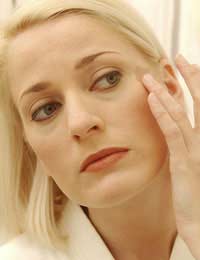The Effects of Alcohol on Skin

Drinking excess alcohol can affect your skin in a variety of ways, making you look unhealthy, tired, and – in some cases – significantly older than you actually are.
Putting skin care products containing alcohol directly onto sensitive skin can also upset its delicate balance, making your skin appear dry, flaky and distinctly lacking in moisture.
Drinking Alcohol and Your Skin
Alcohol and skin are not a great combination. While you may think that having a drink at the end of the day is a relaxing way to unwind, too much alcohol can cause untold damage to your health – and the way you look.Some of the ways in which drinking alcohol can affect your skin include:
- Broken capillaries. Ever heard of the term “grog blossom”? That’s what happens to people who drink too much. The capillaries surrounding their nose become red, as every time your drink alcohol your blood vessels dilate. After a while, this can become permanent – affecting not only the nose but the entire face with red spider veins.
- Worsened rosacea. People who have this condition, which makes the facial skin red and prone to unsightly pimples, often find it gets a lot worse when they drink.
- Skin malnutrition. Drinking lots of water hydrates your skin, but drinking water depletes your skin of the moisture it desperately needs to look and feel healthy. If you drink a lot, your run the risk of your skin looking permanently dull. Dehydration can also make dark circles appear darker, and the skin to lose its plump, fresh appearance.
- Sallow appearance. Over-consumption of alcohol can affect the liver, and cause it not to detoxify the body as well as it should. This can result in an unsightly sallow appearance.
- Wrinkles. Many people smoke when they drink, and we all know that nicotine contributes to the formation of wrinkles over time. Both smoking and drinking also deplete the body of important Vitamin A resources, which are important for protection against free radicals.
Using Alcohol-Based Skin Care Products
Putting alcohol directly onto the skin can also cause undue harm, especially if your skin is delicate or sensitive.Skin care specialists warn against using alcohol-based products, which can even deplete the body of Vitamin A and dilate blood vessels when used topically.
There are, however, good and bad products containing cosmetic alcohols - some of which are actually beneficial to the skin, and help it retain moisture rather than taking it away, or depleting it from the skin.
You should stay away from anything containing ethyl alcohol, ethanol, methanol, benzyl alcohol, isopropyl alcohol, SD alcohol and denatured alcohol – so read the labels carefully.
The following cosmetic alcohols, however, are also known as “fatty alcohols” and can be good for your skin:
- Cetyl alcohol. Often used in baby products, it is gentle and made from coconut oil.
- Cetearyl alcohol. Made from natural oils and fats, it helps your skin get and retain moisture.
- Lanolin alcohol. Made from sheep’s wool, it can be an allergen to some people.
- Steryl alcohol. Also made from coconut oil.
And always read the labels when it comes to skin care products, if only to learn what the “good” and “bad” cosmetic alcohols are. Your skin will thank you!
- Take a Step Back to Heal Problem Skin
- Effects of Stress on Skin
- The Importance of Sleep to Healthy Skin
- What Type of Skin Do You Have?
- Keep Your Skin Healthy and Still Enjoy Christmas
- Dangers of Illegal Skin Bleach
- Practical Make Up Suggestions For Problem Skin
- Foods To Promote Good Skin
- Natural Aids for Beautiful Skin
- Detoxification For Your Skin
- Anti-Ageing Products and Treatments
- Effects of Raging Hormones on Your Skin
- Looking After Sensitive Skin
- Causes of Unhealthy Skin
- The Effects of Smoking on Your Skin
- Looking After Skin During Cold Weather
- The Importance of Water
- Eat Your Way to Fabulous Skin


Re: Identifying and Treating Contact Dermatitis
Hello and Good Day! I have completed an audit of your website, and I would like to share it with you. This…
Re: Identifying and Treating Contact Dermatitis
Hello and Good Day I am Aditya Business Development Manager with a reputable online marketing company based in…
Re: Why Changing Shampoos Regularly Might Harm You
I suffered really badly with post partum hairloss. I lost almost half the hairs on my head. I use good…
Re: Why Changing Shampoos Regularly Might Harm You
I have oily scalp and dry ends. I have been using dove intense repair from last 1 year. I had no issues…
Re: Why Changing Shampoos Regularly Might Harm You
I used dove from last one year its sometime give hairfall nd sometime not thn i switch to sunsilk long nd…
Re: Why Changing Shampoos Regularly Might Harm You
I was using head and shoulders for over 10 years and I always lost a lot of hair. My hair is very thin. I…
Re: Dealing With Seborrheic Keratoses
I have a sebbhoraic keratosis directly under my left eye. It is slowly growing and is currently about almost a centimetre in…
Re: Identifying and Treating Contact Dermatitis
First page rankings on Google We can put your website on 1st page of Google to drive relevant traffic to…
Re: Dealing With Seborrheic Keratoses
It may be interesting to add that seborrheic keratoses might herald certain gastrointestinal malignancies. It's called the…
Re: Medical Treatments for Help With Psoriasis
Wife has all 3 types of Psoriasis and Psoriasis arthritis but cannot get the Apremilast as NICE say she not…